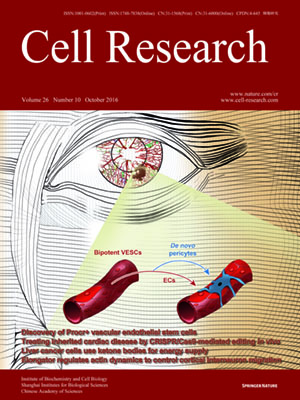
Volume 26, No 10, Oct 2016
ISSN: 1001-0602
EISSN: 1748-7838 2018
impact factor 17.848*
(Clarivate Analytics, 2019)
Volume 26 Issue 10, October 2016: 1112-1130
RESEARCH HIGHLIGHTS
Hepatocellular carcinoma redirects to ketolysis for progression under nutrition deprivation stress
De Huang1,*, Tingting Li1,*, Lin Wang1, Long Zhang1, Ronghui Yan1, Kui Li1, Songge Xing1,2, Gongwei Wu1, Lan Hu1, Weidong Jia2, Sheng-Cai Lin3, Chi V Dang4, Libing Song5, Ping Gao1 and Huafeng Zhang1
1CAS Key laboratory of Innate Immunity and Chronic Disease, Innovation Center for Cell Signaling Network, School of Life Science, Hefei National Laboratory for Physical Sciences at Microscale, University of Science and Technology of China, Hefei, Anhui 230027, China
2Anhui Key Laboratory of Hepatopancreatobiliary Surgery, Department of General Surgery, Anhui Provincial Hospital, Hefei, Anhui 230001, China
3State Key Laboratory of Cellular Stress Biology, Innovation Center for Cell Signaling Network, School of Life Sciences, Xiamen University, Xiamen, Fujian 361005, China
4Abramson Cancer Center, University of Pennsylvania, Philadelphia, PA, USA
5State Key Laboratory of Oncology in Southern China and Departments of Experimental Research, Sun Yat-sen University Cancer Center, Guangzhou, Guangdong 510060, China
Correspondence: Huafeng Zhang, E-mail: hzhang22@ustc.edu.cn; Ping Gao, E-mail: pgao2@ustc.edu.cn; Libing Song,(songlb@sysucc.org.cn)
Cancer cells are known for their capacity to rewire metabolic pathways to support survival and proliferation under various stress conditions. Ketone bodies, though produced in the liver, are not consumed in normal adult liver cells. We find here that ketone catabolism or ketolysis is re-activated in hepatocellular carcinoma (HCC) cells under nutrition deprivation conditions. Mechanistically, 3-oxoacid CoA-transferase 1 (OXCT1), a rate-limiting ketolytic enzyme whose expression is suppressed in normal adult liver tissues, is re-induced by serum starvation-triggered mTORC2-AKT-SP1 signaling in HCC cells. Moreover, we observe that enhanced ketolysis in HCC is critical for repression of AMPK activation and protects HCC cells from excessive autophagy, thereby enhancing tumor growth. Importantly, analysis of clinical HCC samples reveals that increased OXCT1 expression predicts higher patient mortality. Taken together, we uncover here a novel metabolic adaptation by which nutrition-deprived HCC cells employ ketone bodies for energy supply and cancer progression.
10.1038/cr.2016.109
FULL TEXT | PDF
Browse 2126


